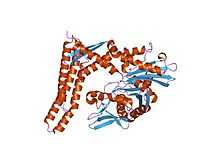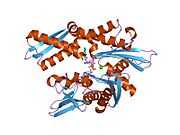HSPA2
Heat shock-related 70 kDa protein 2 is a protein that in humans is encoded by the HSPA2 gene.[1]
References
Further reading
- Schwab CG, Bozak CK, Whitehouse NL, Olson VM (1993). "Amino acid limitation and flow to the duodenum at four stages of lactation. 2. Extent of lysine limitation.". J. Dairy Sci. 75 (12): 3503–18. doi:10.3168/jds.S0022-0302(92)78126-0. PMID 1474216.
- Dworniczak B, Mirault ME (1987). "Structure and expression of a human gene coding for a 71 kd heat shock 'cognate' protein.". Nucleic Acids Res. 15 (13): 5181–97. doi:10.1093/nar/15.13.5181. PMC 305955. PMID 3037489.
- Bonnycastle LL, Yu CE, Hunt CR et al. (1995). "Cloning, sequencing, and mapping of the human chromosome 14 heat shock protein gene (HSPA2).". Genomics 23 (1): 85–93. doi:10.1006/geno.1994.1462. PMID 7829106.
- Roux AF, Nguyen VT, Squire JA, Cox DW (1995). "A heat shock gene at 14q22: mapping and expression.". Hum. Mol. Genet. 3 (10): 1819–22. doi:10.1093/hmg/3.10.1819. PMID 7849706.
- Furlini G, Vignoli M, Re MC et al. (1994). "Human immunodeficiency virus type 1 interaction with the membrane of CD4+ cells induces the synthesis and nuclear translocation of 70K heat shock protein.". J. Gen. Virol. 75 (1): 193–9. doi:10.1099/0022-1317-75-1-193. PMID 7906708.
- Allen JW, Dix DJ, Collins BW et al. (1996). "HSP70-2 is part of the synaptonemal complex in mouse and hamster spermatocytes.". Chromosoma 104 (6): 414–21. doi:10.1007/BF00352265. PMID 8601336.
- Dix DJ, Allen JW, Collins BW et al. (1996). "Targeted gene disruption of Hsp70-2 results in failed meiosis, germ cell apoptosis, and male infertility.". Proc. Natl. Acad. Sci. U.S.A. 93 (8): 3264–8. doi:10.1073/pnas.93.8.3264. PMC 39594. PMID 8622925.
- Zhu D, Dix DJ, Eddy EM (1997). "HSP70-2 is required for CDC2 kinase activity in meiosis I of mouse spermatocytes.". Development 124 (15): 3007–14. PMID 9247342.
- O'Keeffe B, Fong Y, Chen D et al. (2000). "Requirement for a kinase-specific chaperone pathway in the production of a Cdk9/cyclin T1 heterodimer responsible for P-TEFb-mediated tat stimulation of HIV-1 transcription.". J. Biol. Chem. 275 (1): 279–87. doi:10.1074/jbc.275.1.279. PMID 10617616.
- Agostini I, Popov S, Li J et al. (2000). "Heat-shock protein 70 can replace viral protein R of HIV-1 during nuclear import of the viral preintegration complex.". Exp. Cell Res. 259 (2): 398–403. doi:10.1006/excr.2000.4992. PMID 10964507.
- Andersen JS, Lyon CE, Fox AH et al. (2002). "Directed proteomic analysis of the human nucleolus.". Curr. Biol. 12 (1): 1–11. doi:10.1016/S0960-9822(01)00650-9. PMID 11790298.
- Gurer C, Cimarelli A, Luban J (2002). "Specific incorporation of heat shock protein 70 family members into primate lentiviral virions.". J. Virol. 76 (9): 4666–70. doi:10.1128/JVI.76.9.4666-4670.2002. PMC 155079. PMID 11932435.
- Strausberg RL, Feingold EA, Grouse LH et al. (2003). "Generation and initial analysis of more than 15,000 full-length human and mouse cDNA sequences.". Proc. Natl. Acad. Sci. U.S.A. 99 (26): 16899–903. doi:10.1073/pnas.242603899. PMC 139241. PMID 12477932.
- Shin BK, Wang H, Yim AM et al. (2003). "Global profiling of the cell surface proteome of cancer cells uncovers an abundance of proteins with chaperone function.". J. Biol. Chem. 278 (9): 7607–16. doi:10.1074/jbc.M210455200. PMID 12493773.
- Lim MC, Brooke SM, Sapolsky RM (2003). "gp120 neurotoxicity fails to induce heat shock defenses, while the over expression of hsp70 protects against gp120.". Brain Res. Bull. 61 (2): 183–8. doi:10.1016/S0361-9230(03)00113-8. PMID 12832005.
- Ota T, Suzuki Y, Nishikawa T et al. (2004). "Complete sequencing and characterization of 21,243 full-length human cDNAs.". Nat. Genet. 36 (1): 40–5. doi:10.1038/ng1285. PMID 14702039.
- Bouwmeester T, Bauch A, Ruffner H et al. (2004). "A physical and functional map of the human TNF-alpha/NF-kappa B signal transduction pathway.". Nat. Cell Biol. 6 (2): 97–105. doi:10.1038/ncb1086. PMID 14743216.
- Brandenberger R, Wei H, Zhang S et al. (2005). "Transcriptome characterization elucidates signaling networks that control human ES cell growth and differentiation.". Nat. Biotechnol. 22 (6): 707–16. doi:10.1038/nbt971. PMID 15146197.
- Gerhard DS, Wagner L, Feingold EA et al. (2004). "The status, quality, and expansion of the NIH full-length cDNA project: the Mammalian Gene Collection (MGC).". Genome Res. 14 (10B): 2121–7. doi:10.1101/gr.2596504. PMC 528928. PMID 15489334.
- Rual JF, Venkatesan K, Hao T et al. (2005). "Towards a proteome-scale map of the human protein-protein interaction network.". Nature 437 (7062): 1173–8. doi:10.1038/nature04209. PMID 16189514.
PDB gallery |
|---|
| | 1hpm: HOW POTASSIUM AFFECTS THE ACTIVITY OF THE MOLECULAR CHAPERONE HSC70. II. POTASSIUM BINDS SPECIFICALLY IN THE ATPASE ACTIVE SITE |
| 1hx1: CRYSTAL STRUCTURE OF A BAG DOMAIN IN COMPLEX WITH THE HSC70 ATPASE DOMAIN |
| 1kax: 70KD HEAT SHOCK COGNATE PROTEIN ATPASE DOMAIN, K71M MUTANT |
| 1kay: 70KD HEAT SHOCK COGNATE PROTEIN ATPASE DOMAIN, K71A MUTANT |
| 1kaz: 70KD HEAT SHOCK COGNATE PROTEIN ATPASE DOMAIN, K71E MUTANT |
| 1ngi: STRUCTURAL BASIS OF THE 70-KILODALTON HEAT SHOCK COGNATE PROTEIN ATP HYDROLYTIC ACTIVITY, II. STRUCTURE OF THE ACTIVE SITE WITH ADP OR ATP BOUND TO WILD TYPE AND MUTANT ATPASE FRAGMENT |
| 1ngj: STRUCTURAL BASIS OF THE 70-KILODALTON HEAT SHOCK COGNATE PROTEIN ATP HYDROLYTIC ACTIVITY, II. STRUCTURE OF THE ACTIVE SITE WITH ADP OR ATP BOUND TO WILD TYPE AND MUTANT ATPASE FRAGMENT |
| 1qqo: E175S MUTANT OF BOVINE 70 KILODALTON HEAT SHOCK PROTEIN |
| 2bup: T13G MUTANT OF THE ATPASE FRAGMENT OF BOVINE HSC70 |
| 3hsc: THREE-DIMENSIONAL STRUCTURE OF THE ATPASE FRAGMENT OF A 70K HEAT-SHOCK COGNATE PROTEIN |
|
|
|
External links
|
|---|
| Chaperones/
protein folding | |
|---|
| | Protein targeting | |
|---|
| | Ubiquitin | |
|---|
| | Other | |
|---|
| Index of genetics |
|---|
| | Description |
- Gene expression
- DNA
- replication
- cycle
- recombination
- repair
- binding proteins
- Transcription
- factors
- regulators
- nucleic acids
- RNA
- RNA binding proteins
- ribonucleoproteins
- repeated sequence
- modification
- Translation
- ribosome
- modification
- nexins
- Proteins
- domains
- Structure
- primary
- secondary
- tertiary
- quaternary
|
|---|
| | Disease |
- Replication and repair
- Transcription factor
- Transcription
- Translation
|
|---|
|
|











